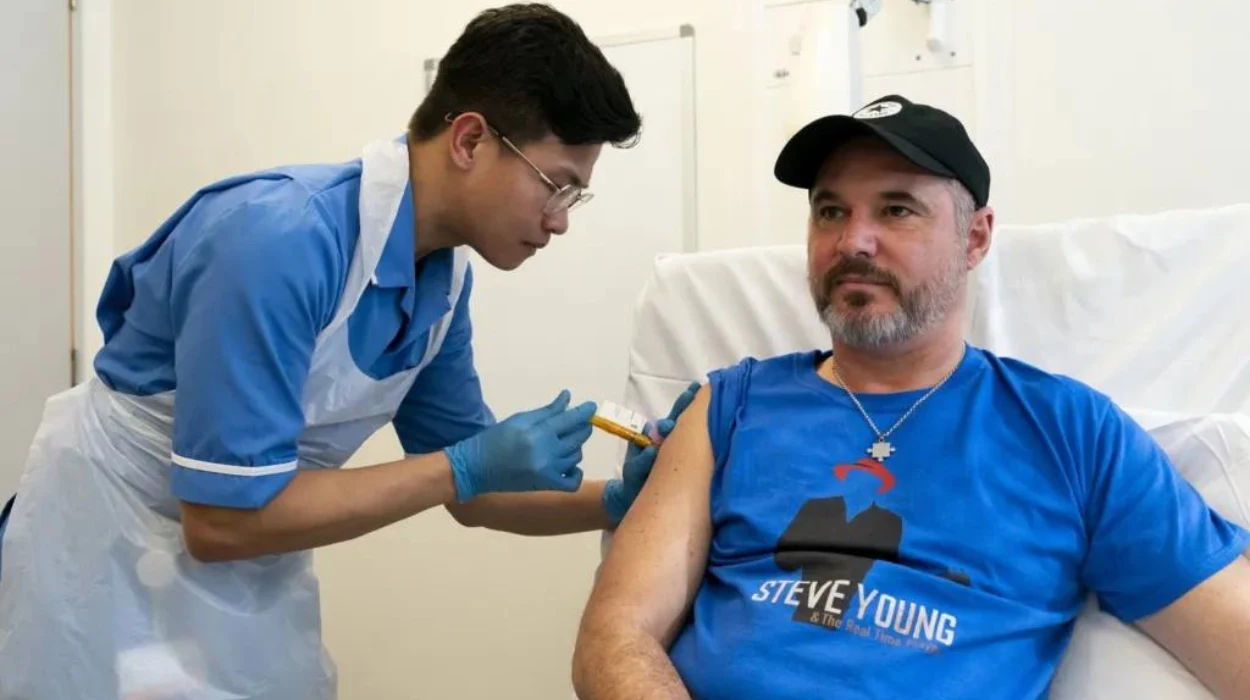An important trial of the world’s first personalized mRNA vaccine against melanoma, the deadliest form of skin cancer, has commenced in the UK. Steve Young, 52, from Stevenage, Hertfordshire, is among the first patients receiving the experimental vaccine. Having had a melanoma growth removed from his scalp last August, Young hopes the vaccine will help his immune system detect and eliminate any remaining cancerous cells, potentially preventing a recurrence.
The vaccine, known as mRNA-4157 (V940), utilizes the same mRNA technology as current COVID-19 vaccines and is being tested in Phase III trials. It is administered in conjunction with another drug, pembrolizumab (Keytruda), which also aids the immune system in targeting cancer cells.
Personalized Treatment
Developed by Moderna and Merck Sharp and Dohme (MSD), the vaccine is tailored to the individual patient, matching the unique genetic signature of their tumor. It works by prompting the body to produce proteins or antibodies that target antigens found exclusively on the cancer cells.
Dr. Heather Shaw, an investigator at University College London Hospitals (UCLH), described the jab as having the potential to cure melanoma and noted that it is also being tested for other cancers, including lung, bladder, and kidney tumors. “This is one of the most exciting things we’ve seen in a really long time,” she said, emphasizing its custom-built nature. “It’s truly personalized and finely tuned for each patient.”
Trial Details and Recruitment
The UK segment of the international trial aims to recruit 60-70 patients across eight centers, including those in London, Manchester, Edinburgh, and Leeds. To participate, patients must have had high-risk melanoma surgically removed within the past 12 weeks. Some participants will receive a placebo, and they will not know which treatment they are receiving.
Young, who is receiving his treatment in London, expressed his optimism: “The trial gave me a chance to feel like I was actually doing something to fight a potential unseen enemy.” He noted that although scans showed he was clear, there was still a risk of undetected cancer cells. “Rather than just wait and hope, I had the chance to get involved in fighting it,” he added.
Melanoma Awareness and Symptoms
Melanoma symptoms to watch for include:
- A new, abnormal mole
- Changes in an existing mole, such as growth or color alteration
- Changes in previously normal skin
The ABCDE checklist helps identify abnormal moles:
- Asymmetry: Is the mole uneven in shape?
- Border: Are the edges blurry or jagged?
- Color: Is there uneven coloring with various shades?
- Diameter: Is the mole larger than others?
- Evolving: Is the mole changing, itching, bleeding, or crusting?
Early detection of melanoma increases the chances of successful treatment. Data from a Phase II trial published in December found that patients with high-risk melanomas who received the vaccine alongside Keytruda had a nearly 49% lower chance of dying or having their cancer return after three years compared to those who received only the drug.
Dr. Shaw expressed hope that this therapy could be a “game-changer,” noting that side effects have been relatively mild, similar to those of flu or COVID vaccines, including tiredness and a sore arm.

